The Rainaldi Quartet Read online
Page 5
‘Now be good for Grandpa,’ she said. ‘Don’t make too much noise, eat your food properly and don’t wake up too early in the morning.’
The children rolled their eyes and shuffled their feet. ‘Yes, yes, Mama. We’ll see you tomorrow.’
Francesca’s husband was waiting by the car, inscrutable in his expensive sunglasses. He had the driver’s door open and was impatient to be on their way. But Francesca had one last duty to perform. She gave me a piece of paper.
‘It’s the list of dos and don’ts,’ she said. ‘What they can eat, what time they each have to be in bed. You know.’
I nodded. She gives me a list of instructions every time. After she’s gone, the first thing I do is throw it in the bin. Children always forget that you brought them up and know a little about it. Or maybe they don’t forget, they just want to do it differently with their own.
Francesca kissed me and the children and we waved them off. Then the kids rushed round into the garden, temporarily free of their shackles, and I didn’t see them again for an hour until they came into the house, hot and sweaty, demanding drinks and biscuits.
Towards midday the phone rang. It was Guastafeste.
‘What are you doing today?’ he asked.
‘I’ve got the grandchildren,’ I explained. ‘I’m taking them for a swim and a picnic. Why?’
‘I wanted to talk to you. About Tomaso.’
‘Come with us. Join us for the picnic,’ I said.
‘I don’t have time for picnics.’
‘It’s Saturday, Antonio. You’re allowed a lunch break, aren’t you? You’ve got to look after yourself better, you know. Get more sleep, eat regularly. You won’t solve this case more quickly by making yourself ill.’
He gave a dry little laugh. ‘Don’t fuss, Gianni.’
‘I mean it,’ I said. ‘You know where we’ll be. The pool by the woods. Midday onwards. I’ll expect you.’
‘I’ll see,’ Guastafeste said.
* * *
The pool we were going to was on the river a few kilometres from Cremona. Not the Po, which is hardly one of the world’s most attractive rivers – if Johann Strauss had been Italian, I doubt he’d have written ‘On the Beautiful Blue Po’ – but on one of the smaller tributaries where the stream was still largely water, as opposed to industrial effluent.
We laid out our rug on the bank and the kids stripped off and leaped into the pool. Francesca doesn’t like me bringing them here, she thinks it’s unsafe and unhygienic, but I take no notice of her. When she was growing up she ignored virtually everything I ever said to her, particularly when she was a stroppy teenager. Now it’s my turn to ignore her.
The children were out of the water again and on the bank, drying off in the sun and eating bread and cheese and tomatoes from my garden, when Guastafeste emerged from the trees, his jacket slung casually over one shoulder. He sat down next to me on the rug and loosened his tie.
‘You want something to eat?’ I said.
‘Is there enough for me?’
‘Of course there is.’
I passed him a chunk of bread and some cheese on a paper plate. He broke off a piece of the bread and chewed it slowly, looking around at the pool.
‘It’s years since I was last here,’ he said. ‘You remember when you used to bring me here? It’s hardly changed at all.’
Guastafeste is the same age as my eldest son, Domenico, still friends with him though Domenico has lived and worked in Rome for the past ten years. Antonio was round at our house to play so often when he was a child, came with us on so many outings that he was almost a part of our family. There was a time, indeed, in his late adolescence when he and Francesca seemed sweet on each other, when I thought he might have become a full member of the family, but it was not to be.
‘Yes, I remember,’ I said.
‘Those long summer days. You used to make a wood fire and we cooked sausages on sticks. They always ended up black and charred like lumps of charcoal. I can still remember the taste.’
He smiled at me. He was looking better today, clean shaven, wearing a crisp white shirt and blue tie, but his eyes were still tired.
‘Grandpa, can we go swimming again?’ Carla asked.
‘Let your food go down first,’ I replied.
‘What about the woods? Can we play in the woods?’
‘Yes, but don’t go too far.’
The children got up from the rug.
‘Hey, I brought you something,’ Guastafeste said. He felt in his jacket pocket and brought out three packets of sweets. He threw them to the kids.
‘Eat them all at once,’ he said.
The children thanked him and ran off into the woods. Guastafeste watched them pushing through the undergrowth, a soft look on his face. He’s always been good with children. He and his ex-wife never had any. He doesn’t talk about it, but I wonder sometimes whether that is not something he regrets. Perhaps not though. He likes children, but he also likes his own space, time to himself that children do not allow you. He lay back on the rug, his hands behind his head.
‘I should come out here more often,’ he said. ‘It’s so quiet, so peaceful. So different from the Questura.’
‘Things are bad?’ I said.
‘The Questore wants a result. And he wants it yesterday.’
‘And are you going to be able to give him one?’
‘Not on what we’ve got so far.’
A fly buzzed towards Guastafeste’s nose. He swotted it away lazily. I helped myself to a left-over tomato and bit into it. There’s nothing quite like a home-grown tomato.
‘We’ve almost nothing to go on,’ Guastafeste said. ‘We’ve done a door-to-door enquiry, talked to all the neighbours. No one seemed to hear, or see, anything of significance that night. No shouting, no cars arriving or leaving, no strangers hanging around the street.’ He sat up and wrapped his arms around his knees, squinting at the sunlight reflected on the surface of the river. ‘He was a violin-maker; a gentle, harmless violin-maker. All right, he could be difficult, dogmatic, opinionated, but he wasn’t the kind of man who made enemies. He wasn’t rich, famous, he wasn’t mixed up with any criminal activity – as far as we know. What had he done, what did he know that made someone want to kill him?’
I finished my tomato and licked some juice off my fingers. I waited for him to go on, to clear out his thoughts.
‘You know this world better than I do, Gianni. If Tomaso was looking for a violin, this Messiah’s Sister, how would he have gone about it?’
‘That’s difficult to say. He must have had something to go on, some lead. There are always rumours about long-lost Stradivaris. Every luthier hopes – dreams – that one day he’ll come across one somewhere. But we never do.’
‘Never?’
‘It’s more than two hundred and fifty years since Stradivari died. The chances of a new, hitherto undiscovered violin of his turning up are almost zero.’
‘Tomaso must have thought he had a chance. He went to England, after all, spent money on an air ticket, hotels. He wouldn’t do that without a good reason.’
‘Do you know where in England he went?’
‘We’re trying to find out. I spoke to Clara again yesterday. She didn’t know where exactly he went. Just that he flew to London, was away for three days.’
‘How was she?’
‘Depressed, tearful, but better than the day before. She’s eating a little, getting some sleep.’
‘Did he have any papers?’ I said. ‘You know, booking slips, hotel confirmation letters, receipts.’
‘We’re checking. We’ve got his diary. That might help us. In fact, that’s why I wanted to talk to you. There was an entry in the diary, an appointment for last Monday. In Venice.’
‘Venice?’
‘With a man named Enrico Forlani.’
I reached out for the bottle of mineral water at the foot of the rug and refilled my cup. My mouth seemed suddenly very dry.
‘I
understand he’s a violin collector,’ Guastafeste said. ‘You ever heard of him?’
I took a sip of water before I replied. ‘Yes, I know his name.’
‘His phone number was in the diary. I called it. He wasn’t very cooperative, refused to talk to me on the phone. Said he’d only speak face to face. Do you know him?’
‘Only by reputation. We’ve never met, but I’ve done some work on his violins, though only through Serafin, never directly.’
‘Is he a big collector?’
‘So they say. He’s very secretive, keeps his collection out of the public eye. But it’s reputed to be big, one of the biggest in the world. He has plenty of money to spend.’
Guastafeste turned his head to look at me. ‘I’m out of my depth here, Gianni. So are my colleagues. We know nothing about violins. I’m worried we might miss things, might overlook something, not realise its significance. If I clear it with my superiors, would you be willing to come on board as a sort of expert adviser?’
‘Tomaso was my friend,’ I said. ‘I’ll do anything I can to help.’
‘Thank you.’ Guastafeste looked back at the river, the water still and limpid, dappled with sunbeams and shadows. ‘It’s tempting, isn’t it?’ he said. ‘I’d just love to strip off and jump in, the way I did when I was a kid.’
‘Why don’t you?’
‘I’m grown up now. I’m not supposed to have fun.’
He stood up and touched me lightly on the shoulder.
‘Say bye to the kids for me.’
* * *
For dinner, the children helped me prepare kebabs to cook over an open wood fire at the bottom of the garden, something they can never do at home. They live in a town, in a second-floor apartment where the only flowers they see are in a window box. I used to be an urban dweller too. For years my workshop was in the centre of Cremona, tucked away in one of the side-streets with the bustle and noise of the city all around. But seven years ago I grew tired of the cars and pollution and lack of space and moved out into the country. I am only a few kilometres from Cremona you can see its hazy silhouette on the skyline – but we are surrounded by fields, by swathes of swaying corn, the tranquillity broken only by the distant rattle of a tractor and the intermittent barking of farm dogs.
When we’d finished skewering the kebabs, Paolo and Carla went out into the garden to collect logs from my woodpile, but Pietro lingered behind in the kitchen. He’d been very quiet while we were making the kebabs and I could see that something was troubling him.
‘What is it, little chap?’ I said.
‘Grandpa,’ Pietro said in his small, high-pitched voice. ‘Why have Mama and Papa gone away?’
‘It’s only for one night. They’ll be back tomorrow.’
‘But why couldn’t we go with them?’
‘They’re doing things you wouldn’t be interested in, boring grown-up things.’
‘Didn’t they want us with them?’
‘It’s not that. Sometimes grown-ups need a bit of time to themselves. They left you with me for a night last year and you didn’t seem to mind.’
But he was a year older now, more aware of what was happening, more conscious of rejection yet unable to rationalise it like his brother and sister.
‘Are they going to come back?’
He looked up at me and I saw that he was crying.
‘Oh, Pietro.’
I put down the knife I was using to chop vegetables and sat him on my lap. With my finger I wiped away the tears on his cheeks.
‘Of course they’re going to come back,’ I said.
‘Are you sure?’
‘Yes, I’m sure. Shall I tell you something, something your old grandpa has learned over the years? There are very few simple truths in life, but there is one that’s universal, that’s true for everyone. And that is that your mother and father love you more than anything in the world. You and Carla and Paolo. And they will continue to love you. Even when you’re grown up and you’ve left home and are making your own way in the world they will still love you. Believe me, I know.’
Pietro sniffed and looked up at me. ‘So they’ve not left us?’
‘No, you silly old thing. Tomorrow afternoon they will be back for you. You can wait until then, can’t you?’
‘I’ll try.’
‘Good boy. Now why don’t you come and help me light the fire?’
We made a big blaze at the far end of my vegetable patch and waited until the flames had died down and the logs were glowing red before we put the kebabs on to roast. There were thick chunks of lamb and red peppers and onions on the skewers. We ate them with bread and potatoes and crisp green beans followed by ripe peaches. Then we sat around the embers as night fell and I told them creepy ghost stories, Pietro pressing up close to me, shivering and asking for more.
I regretted it later, though, for when I finally put them to bed they were too terrified to sleep. I sat beside Pietro, stroking his head and murmuring soothingly until at last he dropped off. I stayed there for a while afterwards, remembering when Francesca and her two brothers had been little and I would sit watching over them sometimes while they slept. It seemed such a very short time ago.
* * *
I was dozing in my chair under the shade of my cherry tree when Francesca and her husband returned.
‘Papa,’ Francesca said, shaking me gently.
‘Ah, you’re back,’ I said sleepily, rubbing my eyes and stretching.
Francesca was looking around the garden. ‘Where are the children? Are they inside?’
‘They’re somewhere,’ I said vaguely.
‘You mean you don’t know?’
‘They’re off exploring in the fields.’
Francesca stared at me. ‘You let them go off on their own?’
‘I told them not to go far.’
‘Papa, how could you be so irresponsible? They could have been abducted.’
‘No one would abduct those three, they wouldn’t dare.’
‘It’s not funny. There are all sorts of perverts and weird people out there. Anything could have happened.’
She marched off down the garden, her husband in tow, and disappeared into the fields at the bottom. Twenty minutes later they reappeared herding three sheepish children. The kids were dishevelled, dirt smeared all over their clothes and faces. All three of them were carrying sticks. Even I had to admit they looked pretty scruffy.
‘Go inside and clean yourselves up,’ Francesca ordered as they drew level with me.
‘Aw, do we have to?’ Paolo said.
‘Now.’
‘We saw a rabbit,’ Carla said to me proudly. ‘Eating grass. It was this big.’ She held out her hands to demonstrate.
‘Can we go swimming again, Grandpa, before we go home?’ Pietro asked.
I looked away, sensing Francesca’s steely gaze coming to bear on me. She waited until the children were inside the house before she opened fire.
‘Swimming? How did you take them swimming? I didn’t leave their costumes.’
‘They went skinny dipping,’ I said.
‘Skinny dipping! Papa, you didn’t take them to the river? That filthy, germ-ridden pool?’
‘It’s not filthy,’ I protested. ‘It’s perfectly all right. I used to take you there when you were little and it never did you any harm.’
‘Things are different now. Pollution is worse. That pool’s full of bacteria.’
‘What’s wrong with that? Kids of today don’t get enough bacteria. It does them good, builds up their resistance.’
Francesca’s mouth tightened, but she didn’t pursue the argument. I knew that the moment they got home she’d be scrubbing the children with disinfectant and taking their temperatures.
It was strange when they’d gone. My initial response was one of relief – that the noise, the relentless exhausting activity of young children had ceased. But after I’d caught my breath, I began to miss having them around. My sense of isolation and loneliness s
eemed more acute than ever, so I did what I always do when melancholy threatens to overwhelm me. I went into my workshop, put one of my old Heifetz LPs on the record player and immersed myself in my work, in the soothing therapy of carving wood.
It was almost dark outside when the telephone rang. I picked up the extension near my workbench and heard Guastafeste’s voice.
‘It’s all fixed,’ he said. ‘What are you doing for the next couple of days?’
‘Just working, as usual.’
‘Anything urgent?’
‘Not particularly. Why?’
‘Pack an overnight bag,’ Guastafeste said. ‘We’re going to Venice in the morning.’
4
We arrived in Venice in the late afternoon. It was several years since I’d last been there, but Venice changes very little and when it does the difference is barely perceptible. When you walk out of the station and see the Grand Canal in front of you the impact is still exhilarating, still sublime, no matter how many times you have been there. And the smell is still the same – a tang of the sea mixed with undertones of fetid water, rank sewage and diesel fumes from the motor boats.
The walk to our hotel – a small pensione near the Teatro La Fenice which Guastafeste had booked in advance – was the usual Venetian obstacle course of tourists and dog dirt. We left our bags in our rooms, then walked back to the Grand Canal and stood for a moment on the Accademia Bridge. Venice has always been a chiaroscuro city, a place where the light and shadow change suddenly and unexpectedly. One moment it seems dilapidated and tawdry, the next the sunlight alters and you catch a glimpse of a beauty that makes your heart miss a beat. From our vantage point on the bridge, the surface of the Grand Canal, which had looked brown and oily when we arrived, now had the sheen of shot silk. The exposed banks of mud along the edges had the appearance of the expensive youth-giving unguent women apply to their wrinkles rather than the poisonous slime it really was.
Enrico Forlani’s home was a palazzo on the western side of the Grand Canal. It took us a while to find it in the labyrinth of narrow streets and alleys, and when we finally stopped outside its door it didn’t look much like a palace. The stucco had broken away from the walls in large chunks, revealing the brickwork underneath. The paint on the door and windows was chipped, the shutters faded and rotting in the damp air. Guastafeste rang the bell on the entryphone a few times, holding it in for several seconds each time. Eventually a man’s head appeared at the window above us.

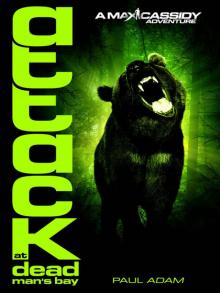 Attack at Dead Man's Bay
Attack at Dead Man's Bay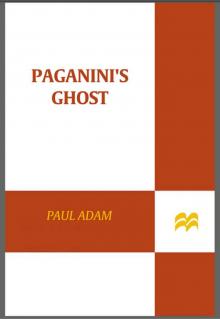 Paganini's Ghost
Paganini's Ghost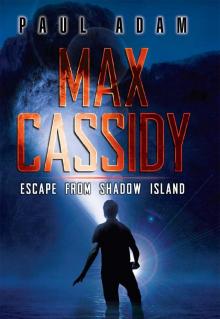 Escape from Shadow Island
Escape from Shadow Island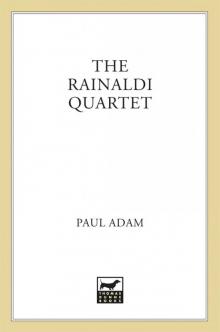 The Rainaldi Quartet
The Rainaldi Quartet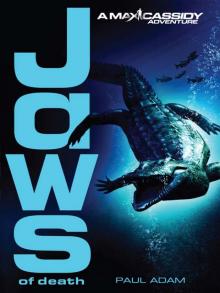 Jaws of Death
Jaws of Death